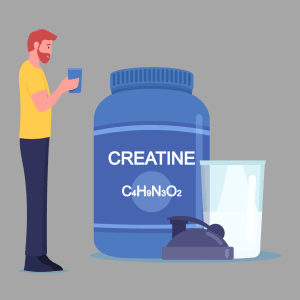A question that we get here is: What is creatine? Rather than giving the scientific and confusing answer, we simply say, “It gives more energy to the muscles to lift more weights.” However, the answer is much more in-depth since creatine can also be used to enhance brain health!
Even though it is primarily used in sports, it can also be used for general fitness. Creatine helps produce adenosine triphosphate (ATP) in the cells and helps provide energy for muscle contractions, thus producing more force. Creatine helps during the Krebs cycle, which is what produces ATP naturally in your cells. Creatine is also naturally produced in our body, and it is also found in food such as red meat, but it is a very small amount.
There are many forms of creatine that are available, but there are two that are worth looking into if you want to increase strength gains and improve your performance. The other types of creatine are good as well, but they are not needed. Creatine is one of the few supplements that has been researched for many years and has been proven to work better than almost any other supplement. Here are the two creatine supplements that we would recommend to take.
Creatine Monohydrate: This is the most common form of creatine in the market; this creatine is bonded with a water molecule and has been the most researched form of creatine. This is relatively inexpensive since an average container of 60 servings is around $30. Creapure is also just creatine monohydrate but made in Germany and inspected to ensure 100% purity.
Creatine Hydrochloride (HCL): This will give you the results that creatine monohydrate can deliver but much quicker, as it will increase the work capacity (workouts), strength gains, and muscle recovery. The one downside is that it is more expensive when compared to monohydrate and will cost almost double of what you would get with simple monohydrate. If you have the money for it, I would recommend it, but it is not needed. Creatine monohydrate will work just as fine.
Potential side effects of using creatine involve bloating, upset stomach, weight gain, and liver dysfunction. However, some of these side effects occur if you overdose on creatine or if you already have a history of health issues to begin with. We recommend taking 5g of creatine a day for the first 3-5 days, then slowly increasing the dosage as you get used to it. We do not recommend going over 20g a day, but that also varies from person to person. You can choose to either take 5g a day for a long period of time (4-6 months) or load with 20g a day for a short time (1-2 months) then reduce the dosage. Find out what works best for you.

